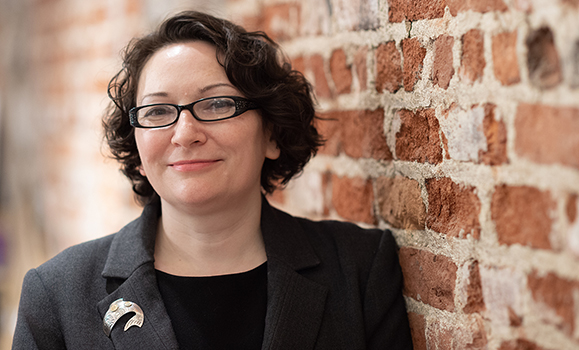Poverty impacts many Canadians and anecdotal evidence shows that individuals who identify as part of the 2SLGBTQ+ (Two-Spirit, Lesbian, Gay, Bisexual, Trans, Queer, plus) community can be considerably more vulnerable to it.
Dr. Margaret Robinson, Tier 2 Canada Research Chair in Reconciliation, Gender, & Identity at Dalhousie, can attest to this from first-hand experience as a two-spirit and bisexual woman with lived experience of poverty.
“I grew up in rural poverty,” explains Dr. Robinson, an associate professor in the departments of English and Sociology and Social Anthropology, of her upbringing outside Sheet Harbour, N.S., in the Mi’kmaw district Eskikewa'kik. “My family didn’t get indoor plumbing until I was in junior high school, but it wasn’t something you talked about.” Instead, she pretended everything was normal, “never mentioning melting snow to wash or having bill collectors threaten me on the phone.”
She transitioned to urban poverty as an undergraduate student, going to food banks and getting cash advances on her Canadian Tire card so she could pay her rent. “I’ve been close to homeless many times. But I learned to do a lot with a little, and it got me interested in issues such as food and housing insecurity.”
Now, Dr. Robinson brings her personal experience and research expertise to the table as part of the first national study to examine 2SLGBTQ+ poverty in Canada. She says the project — 2SLGBTQ+ Poverty in Canada: Improving Livelihood and Social Wellbeing — is being led by 2SLGBTQ+ people and brings together dozens of multidisciplinary academics, workers in community-based non-profits, and individuals from the impacted communities who have experienced poverty.

Dr. Margaret Robinson. (Submitted photos)
The project, funded through a Partnership Grant from the Social Sciences and Humanities Research Council of Canada (SSHRC), will study both the extent and effects of poverty on the 2SLGBTQ+ communities across Canada between 2022–2028. It will produce an evidence-based action plan that can assist governmental agencies, non-profits, and private organizations in taking action.
A Canada-wide survey will allow the research team to identify large-scale patterns and regional differences. Interviews and focus groups will examine issues in detail to better understand the context of the survey results.
“For the first time, we’ll be able to produce regional and national data that demonstrates the scope and impacts of poverty in our communities,” explains Dr. Robinson.
Dispelling the ‘gay affluence’ myth
Dr. Robinson says she will contribute to the national study in a few ways.
“I’ve had a role in shaping the survey with a mind to how the data can be useful for two-spirit people, the organizations that serve us, and Indigenous governments,” she explains. “Later, I’ll help to analyze interviews and to shape how we share study findings.”
 Dr. Madison Trusolino (shown right), a postdoctoral fellow in Dal’s Department of English, will play a leading role in the day-to-day operations of the study. Dr. Trusolino researches labour organizing in the arts and culture industries and how it can impact marginalized populations.
Dr. Madison Trusolino (shown right), a postdoctoral fellow in Dal’s Department of English, will play a leading role in the day-to-day operations of the study. Dr. Trusolino researches labour organizing in the arts and culture industries and how it can impact marginalized populations.
“Many creatives work multiple precarious jobs, and that low pay is a major obstacle to entry in artistic fields,” says Dr. Trusolino, who Dr. Robinson supervises. “While it is important to consider how sexism, homophobia, and transphobia act as barriers to 2SLGBTQ+ people in the arts and culture industries, it is also integral to consider how the material and psychological experiences of poverty contribute, and often are foundational, to these barriers.”
She says it’s been difficult to find statistics on 2SLGBTQ+ communities because collecting this data generally is still relatively new. It wasn’t until 2021 that the Canadian census included a question on gender that also asked about someone’s assigned sex at birth.
“While these efforts are not inconsequential, they are also still in the works and have yet to provide the kind of data necessary to address 2SLGBTQ+ poverty in Canada,” she explains.
Dr. Trusolino says data is currently lacking in part due to the persistent ‘gay affluence’ myth that perpetuates the idea that gay and lesbian people make more money than their straight counterparts. “This is grossly inaccurate and contributes to the lack of data on the subject,” she says.
A review of academic literature about 2SLGBTQ+ poverty in 2020 showed no peer-reviewed studies of 2SLGBTQ+ poverty in the Atlantic region, added Dr. Robinson.
“That means our governments don’t know what the real conditions are for their 2SLGBTQ+ constituents,” she says. “This study can find out.”
A chance to have voices heard
Dr. Robinson adds that 2SLGBTQ+ communities have long been excluded from economic policy, and we need policy that’s not based on stereotypes.
“Our communities are complex, so the factors shaping economics in our communities are complex too,” she says. “Many 2SLGBTQ+ women have children, and women are usually paid less than men so that inequity is compounded in relationships between women.”
Discrimination in hiring also poses problems, she says.
“People who are read as queer may be limited to working in service roles — as a hairdresser or barista,” she says. "I worked in coffee retail for years, and while it was queer-friendly, it wasn’t lucrative. I ate expired pastries and came home too sore and exhausted to cook or study. When I injured myself at work, I had to tape it up and keep going. I couldn’t afford time off to recuperate. And I was one of the lucky ones.”
Dr. Robinson notes that Nova Scotian researchers and organizations are contributing a lot to this study. Dr. Maryam Dilmaghani, a professor of economics at Saint Mary’s University, is also on the research team and the Nova Scotia Rainbow Action Project is a community partner.
Two surveys will be rolled out this year. Some participants will then be invited for interviews conducted by peer researchers — 2SLGBTQ+ people with lived experience of poverty — hired from local communities. Dr. Trusolino and Dr. Hazal Goktas, a postdoctoral fellow at York University, will work closely with the researchers and supervise research assistants.
Dr. Robinson encourages people in 2SLGBTQ+ communities to get involved and talk about poverty with friends.
“When the study comes to your province, complete the survey and tell others about it,” she says. “If you’re willing, indicate your interest in doing an interview or focus group. This is our chance to have our voices heard.”

